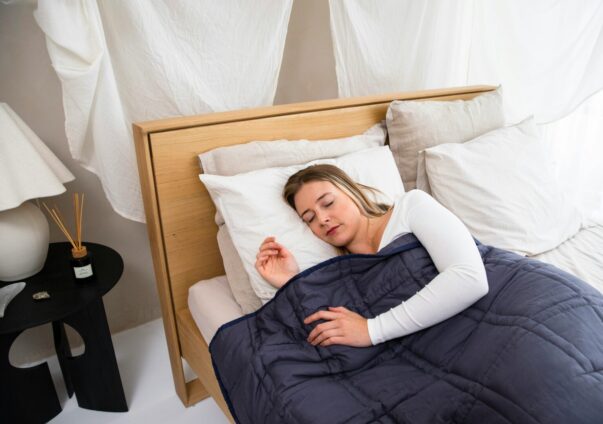
How does sleep impact weight loss?
Trying to lose weight but not seeing results? Poor sleep could be part of the puzzle.
Sleep plays a big role in weight management. It affects hunger hormones, energy levels and how your body stores fat. Even just a few restless nights can make it harder to stick to healthy habits. The good news? Small changes to your routine can help, and progress doesn’t have to be perfect.
Could Oviva’s NHS-funded weight management service help you? You’ll get a personalised weight loss plan, dedicated health coach to help you build better habits, and weight loss injections (if appropriate).
Key Takeaways:
- Sleep affects weight by regulating hormones associated with hunger, fullness, cravings and fat storage.
- Better sleep quality can boost weight loss results by improving energy levels, motivation, and hormonal regulation.
- Lifestyle tweaks – like reducing caffeine, staying active and managing stress – can help you sleep better.
- Oviva offers personalised weight loss support, including help with building healthier sleep habits.
How does sleep impact weight?
We’re often told to aim for 7 to 9 hours of sleep each night – but with modern routines, stress, or shift work, that’s not always easy. Still, getting enough rest matters. Sleep plays a powerful role in how your body manages hunger, energy and fat storage, all key for weight management.
If you’ve ever thought “I’m doing everything right – so why am I not losing weight?”, poor sleep could be one of the missing pieces.
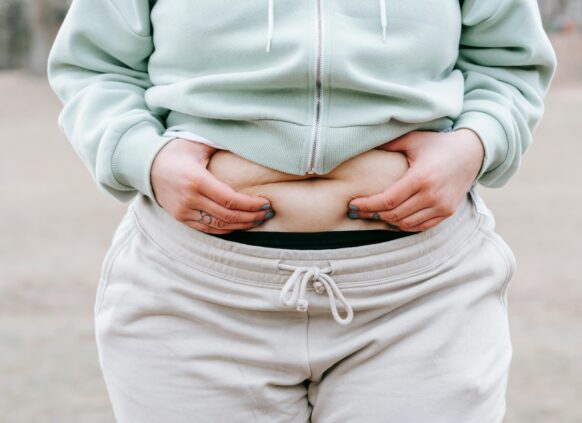
Hunger hormones and appetite
Sleep helps regulate two key hormones that control your appetite:
- Ghrelin – the ‘hunger hormone’ tells your brain when you’re hungry
- Leptin – helps you feel full after eating
When you don’t get enough sleep, ghrelin levels rise and leptin levels drop – which means you’re more likely to feel hungry and less likely to feel satisfied after eating.
One study found that people who were sleep-deprived had lower leptin and higher ghrelin, making it harder to manage appetite. Over time, this can lead to overeating and weight gain.
Sleep, metabolism and fat storage
Lack of sleep can disrupt your metabolism – the process your body uses to turn food into energy.
One reason for this is insulin resistance, which becomes more likely when you’re not sleeping well.
- Insulin helps move glucose (sugar) from your blood into your cells to be used for energy.
- When you’re insulin resistant, your body doesn’t respond as well to insulin.
- That means more glucose stays in your bloodstream, and instead of being used for energy, it gets stored as fat – especially around your belly.
Poor sleep doesn’t just leave you tired – it can also lead to insulin resistance, more fat storage and make weight loss harder over time.
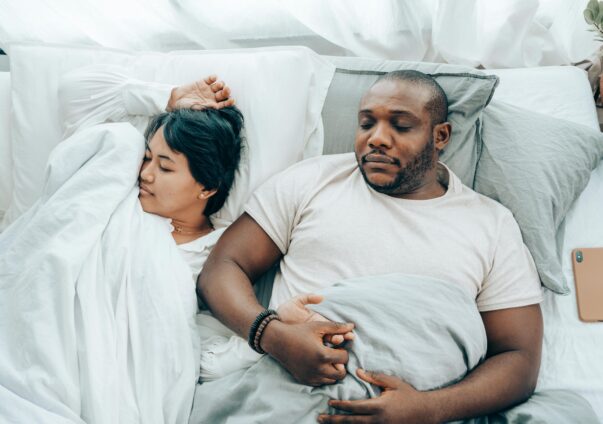
Sleep deprivation and weight gain
Studies show that fat mass increases when sleep duration and quality drop. One study found that people following a calorie-restricted diet lost more weight when they spent 8.5 hours in bed per night compared to just 5.5 hours.
Sleep also affects your stress levels. When you don’t get enough rest, cortisol (the stress hormone) can rise. Over time, this has been linked to fat accumulation – especially around the abdomen.
And if your energy’s low after a bad night, motivation to move can drop and you may be more tempted to reach for high-calorie snacks – a common way the body tries to boost energy quickly. One study found that sleep deprivation increased the desire for high-calorie, energy-dense foods. Over time, regularly choosing these foods can lead to weight gain
Sleep apnoea and obesity
Sleep apnoea is a health condition where your breathing stops and starts while you sleep. Most symptoms happen overnight, but the impact is often felt during the day too.
Poor sleep from sleep apnoea can leave you feeling tired, low on energy and more likely to experience increased appetite and weight gain – especially when combined with the effects of disrupted hunger hormones.
Lifestyle changes like losing weight, drinking less alcohol, quitting smoking and getting regular exercise can help ease symptoms.
Because it’s often linked to excess weight, sleep apnoea is classed as a weight-related condition. If you’re living with sleep apnoea and have a BMI over 35, you may be eligible for NHS-funded support and prescription weight loss injections through Oviva’s personalised weight management programme.
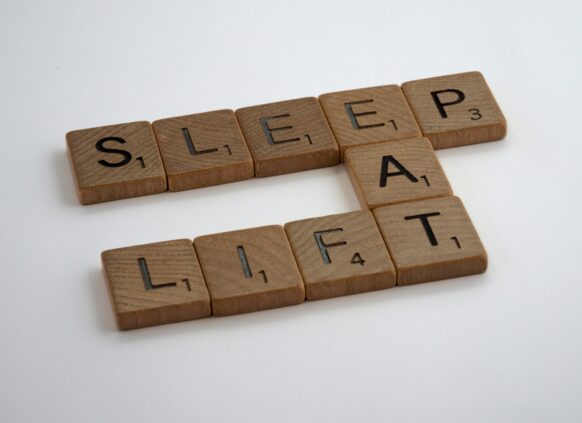
Does better sleep help with weight loss?
Yes – better sleep can support your weight loss goals for a few reasons.
Getting enough rest helps regulate key hormones like ghrelin, leptin and cortisol, which affect your appetite, cravings and how full you feel. When these are balanced, it’s easier to make healthier food choices.
More sleep = more energy, making it easier to move more and avoid energy dips that lead to snacking.
When you sleep, your body releases growth hormone (GH) – which helps with muscle repair. Without enough rest, recovery can take longer, and you might not feel up to exercising as often.
How to improve sleep for better weight management
Getting enough good-quality sleep isn’t always easy.
If you’re working shifts, raising young kids or juggling a busy schedule, sticking to a perfect sleep routine can feel impossible. But even small changes can help you get more restful sleep, and that can make a real difference to your energy, mood and weight.
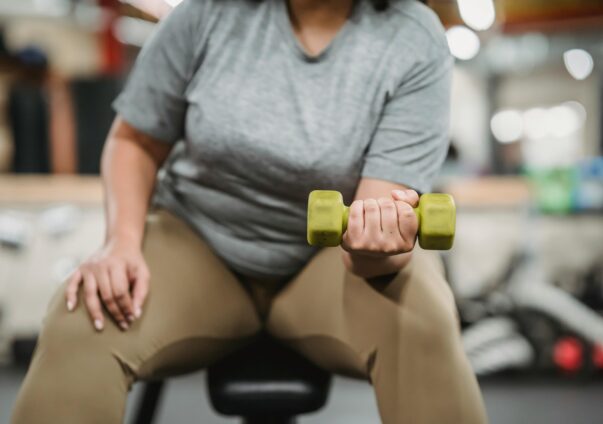
Exercise and sleep
Moving more during the day can help you sleep better at night – and the relationship works both ways.
Research shows that people who are more active tend to sleep better, while those who spend more time sitting or lying down often experience poorer sleep quality.
The good news? You don’t need to hit the gym to see benefits.
Small changes like standing more, going for a brisk walk, or doing housework (yes, even vacuuming and mowing the lawn!) can all help.
One study found that people classed as ‘sufficiently active’ were also more likely to get at least 7 hours of sleep per night.
Another found that more time spent sedentary was linked to worse sleep quality.
And the cycle continues: Better sleep makes it easier to stay active – and staying active supports better sleep.
Better sleep starts with better habits
Sleep hygiene is the small habits and environmental changes that can make a big difference to how well you sleep. Here are a few you can try:
- Limit blue light before bed. Avoid screens in the hour before you sleep, or switch devices to night mode. Try reading or listening to music instead of scrolling.
- Create a calm sleep environment. Aim to keep your bedroom cool, dark and quiet.
- Stick to a routine. Going to bed and waking up at similar times each day helps your body settle into a healthy sleep rhythm.
- Watch what you eat and drink. Caffeine and alcohol can disrupt sleep, especially later in the day. Try to eat well in the evening and avoid stimulants where you can.
- Don’t oversleep. Too much sleep can also affect hormones and energy levels – aim for 7 to 9 hours where possible.

How Oviva can support your weight loss journey
Oviva is an NHS-funded weight loss programme designed for people with weight-related health conditions – like sleep apnoea, type 2 diabetes or PCOS.
With Oviva, you’ll get:
- Personalised support from dietitians, doctors and psychologists
- A plan that fits your life – covering food, movement, sleep and more
- Access to prescription weight loss medication, if eligible
- An easy-to-use app to track meals, activity, progress and goals
No calorie counting. No intense exercise regimes. Just sustainable, expert-led support to help you lose weight – and keep it off.
97% of users recommend Oviva, and the average weight loss after 12 months is 13.6 kg.
